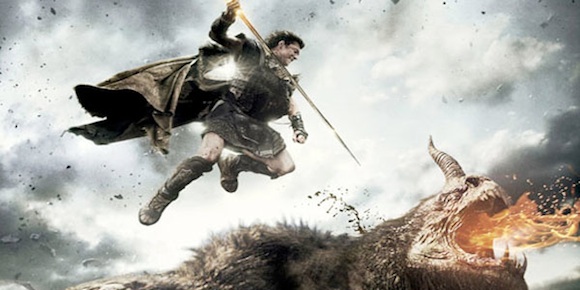Movie Review: Wrath of the Titans
When any film, regardless of artistic merit or aesthetic quality, approaches the $500 million mark in box-office revenue globally, a sequel is all but assured. Exhibit A: Clash of the Titans, the disappointing 2010 remake of the 1981 fantasy-adventure.
A muddled, underwritten script, paycheck-slumming actors, and a rushed 3D post-conversion left many, including critics and second-weekend audiences, underwhelmed by the result. Regardless of whether audiences were (and are) eager to revisit the warring Greek gods, demi-gods, and CG monsters, Warner Bros. decided that’s what moviegoers want more than anything else. Unfortunately, Wrath of the Titans, is a marginal improvement over its non-illustrious predecessor.
Renowned for saving Andromeda (Alexa Davalos then, Rosamund Pike now), a Greek princess, from the Kraken, Perseus (Sam Worthington), the half-human son of Zeus (a superbly bewigged, bearded Liam Neeson), the greatest god of (Greek) gods), has turned away from the taxing life of a Greek hero for the presumably quiet life of a village fisherman. At the end of Clash of the Titans, Zeus resurrected Io (Gemma Arterton), Perseus’ love interest, as a gift to his most-favored son. A decade later, Perseus is a single father to Helias (John Bell), Io (Arterton) jettisoned due to a scheduling conflict (Hansel and Gretel: Witch Hunters).
Perseus seems relatively content, but the return of the long-absent Zeus doesn’t bode well for Perseus. A somber, grim Zeus drops some heavy, potentially world-shattering exposition on the reluctant Perseus. Zeus warns Perseus that he’ll have to step up again and save the world again, this time from Kronos, Zeus’ father. Zeus and his two brothers, Poseidon (Danny Huston), the ruler of the seas, and Hades (Ralph Fiennes), the ruler of the Underworld, deposed Kronos as ruler of the Greek gods and imprisoned him inside Mount Tartarus countless millennia ago.
Still holding a grudge against Zeus for real and perceived betrayals, Hades betrays an unsuspecting Zeus. Hades easily convinces Zeus’ other estranged son, Ares (Édgar Ramírez), a.k.a., the god of war, to side with him against Zeus, an easy task given Ares’ open hatred of Zeus’ most-favored son, Perseus. To free Kronos from his labyrinthine prison, Hades has to siphon off Zeus’ powers. Not coincidentally, that particularly slow-to-unwind plot device gives Perseus all the time he needs to recapture his action-hero mojo, reunite with princess-turned-queen Andromeda, locating and, as it turns out, freeing his long-lost cousin Agenor (Toby Kebbell), Poseidon’s half-human son, and the “Fallen One,” Hephaestus (Bill Nighy). Hephaestus holds the metaphorical key(s) to defeating Kronos.
Everyone in Wrath of the Titans, god and man alike, has father and brother issues, issues resolvable only through conflict and war. Kronos, depicted here as a gigantic lava monster, has spent eons contemplating revenge. Apparently, Kronos doesn’t just want to rule gods and men again. He also wants to remake the world in his image (i.e., destroy the world before re-creating it). Either that or the screenwriters, Dan Mazeau and David Johnson (Red Riding Hood, Orphan), recognized an action-fantasy blockbuster isn’t an action-fantasy blockbuster without the requisite amounts of CG-driven mayhem and destruction. To director Jonathan Liebesman’s credit, he reverts to a more traditional filmmaking style, avoiding the jerky, jittery shaky cam that made his much-maligned last film, Battle L.A., a difficult movie-going experience. Classically composed and choreographed, the action scenes are generally easy to follow (a must for any film released in 3D).
Unfortunately, the same can’t be said for Mazeau and Johnston’s sub-videogame-quality screenplay. They borrow one, half-interesting idea from Neil Gaiman’s American Gods, that the gods are losing their powers due to a lack of prayer or worship, but do little with it. They also don’t bother to explain where the other, lesser gods have gone. Are they absent by choice or have they disappeared? Ultimately, their screenplay functions to move under-characterized, under-motivated characters from one set piece to another. Mazeau and Johnson’s attempts at humor, primarily through Agenor and Hephaestus’s verbal antics, add little and subtract much from what could have been, if not a classic of the fantasy genre, then a more tolerable, watchable one. For all of its faults, however, Wrath of the Titans will leave moviegoers with one of the most memorable monsters, CG or otherwise, ever put on (digital) film: Kronos.
Showtimes and Tickets








